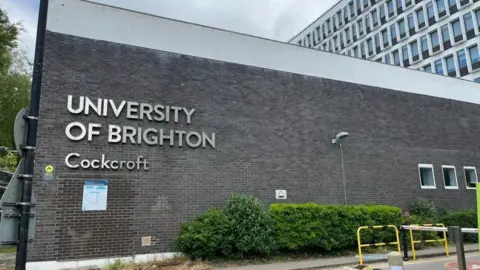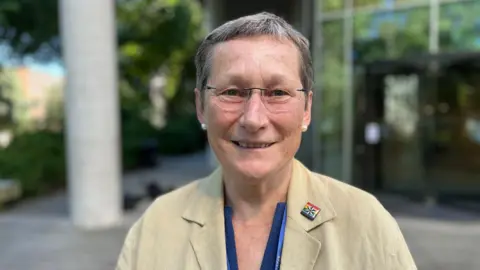What does the next government do about education?
 BBC
BBCFunding, pay and the increasing expectation from schools will challenge the next government's education policy, educators and parents in Kent and Sussex are warning.
As always in elections, education has played a major part in the campaigns of the main parties ahead of the vote.
Ben Hulme, executive head teacher at St Paul’s Church of England Primary School in Swanley, Kent, said funding is one of the biggest issues, both staffing and being able to support pupils and their families.
He said the other agencies that might have done so previously "just aren’t there any more".
 BBC/Claire Starr
BBC/Claire StarrThe legacy of covid has had an impact too. Teacher James Johnson remembers having to show a child how to use a knife and fork when they came back from learning at home during the pandemic.
He said things like that are proving to be "completely different" to when he started teaching.
Attendance at St Paul’s has returned to pre-pandemic levels, but ongoing absences, teachers striking and the need for more funding have all affected schools.
Mr Johnson said budgets are "the scariest thing" and that "quite often the answer is no now because we can’t afford it".
Mr Hulme thinks if we can get "education right, then hopefully everything else will fall into place".

Karen and David Fox’s 13-year-old son, who has autism, has been taught at home in Polegate, East Sussex, since he left primary school.
They said he found going to school traumatic due to his sensory needs.
Ms Fox claimed there were "loads" of children with special educational needs that were being home educated because school is "not the right environment for them".
Describing it as "a battle", Ms Fox said there was "an awareness the system is broken", but did not think there was enough awareness of how much funding is needed for building special schools or providing existing schools with a specialist SEND provision.
An East Sussex County Council spokesperson said the council "works with parents and carers to find an education which can meet their individual needs" and said it gave them "the opportunity to achieve the best possible outcomes".
The spokesperson added: "While special schools are the most appropriate option for some, for many children and young people with SEND, being able to remain with their peers at their local mainstream school with additional support is best for their long-term outcomes.
“We have a very high number of specialist placements, per head of population, compared to other local authorities in the South East and in recent years have built four new special schools to cater for increasing demand.
"We continue to review our level of specialist provision and have also invested in facilities attached to mainstream schools.”

University of Brighton students report having to have a job alongside full time studying.
Tuition fees have not changed for nearly 10 years, but the university said inflation means each fee is now worth around £6,000 in real terms.
Energy prices and increasing pension contributions mean that costs are accelerating for the university.
It has left sites in Hastings and Eastbourne, consolidating facilities in Brighton, and made some staff redundant, something its vice chancellor said was happening across the sector.
 BBC/Claire Starr
BBC/Claire StarrProfessor Debra Humphris believes the current financial model supporting universities isn’t working for "students, staff or institutions".
She wants a strategic plan for higher education setting out the direction government wants for how higher education plays it role in society.
What do the parties say?
All of the five major parties have been contacted for comment.
A Conservative spokesperson said: "Our plan is working but we must stick to it so we can deliver on our manifesto commitments of building 15 more SEND schools to deliver a world-class education for all, and funding 100,000 high quality apprenticeships by curbing the number of poor quality university degrees."
The Liberal Democrats said they have an "ambitious and fully costed plan", including putting a dedicated mental health professional in every primary and secondary school and extending free school meals to all children in poverty, increasing funding for special educational needs and ensuring all trainee teacher posts are paid.
The Labour manifesto said it would recruit 6,500 more teachers, paid for by ending tax breaks for private schools. The party wants to modernise the curriculum, reform assessment, and create higher quality training and employment paths. It said it would take a community wide approach to meet the needs of children with special educational needs and would bring forward a comprehensive strategy for post-16 education.
In its manifesto the Green Party said it would increase school funding by £8 billion, including £2 billion for teachers' pay. In higher education they promise to restore grants and end tuition fees and some school testing. They will also push for free transport for 16 to18 year olds with special educational needs.
Reform UK has said in its manifesto it would have no VAT on independent school fees to ease pressure on state schools. It would also scrap interest on student loans and restrict undergraduate numbers to below current levels.
Follow BBC Kent on Facebook, on X, and on Instagram. Send your story ideas to [email protected] or WhatsApp us on 08081 002250.
